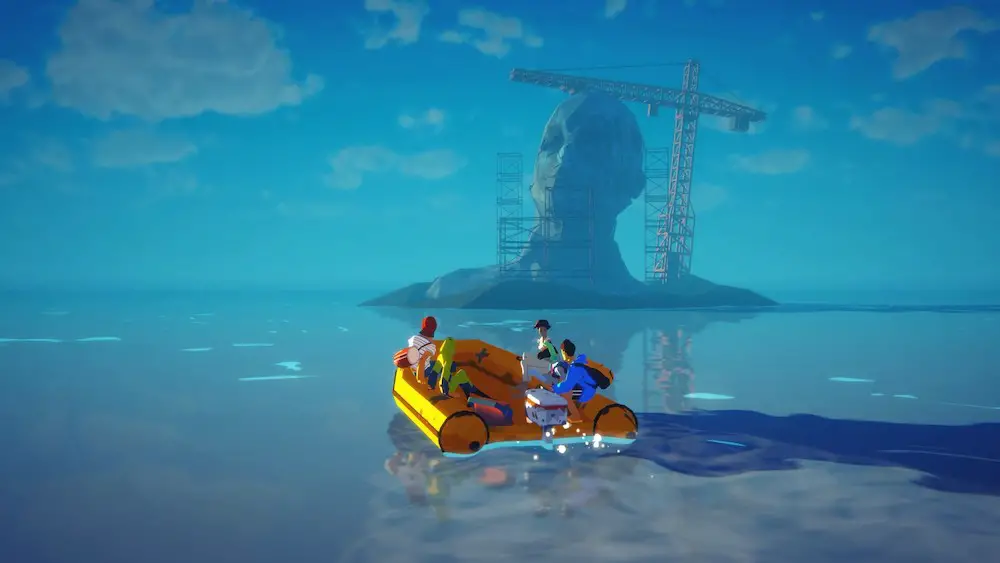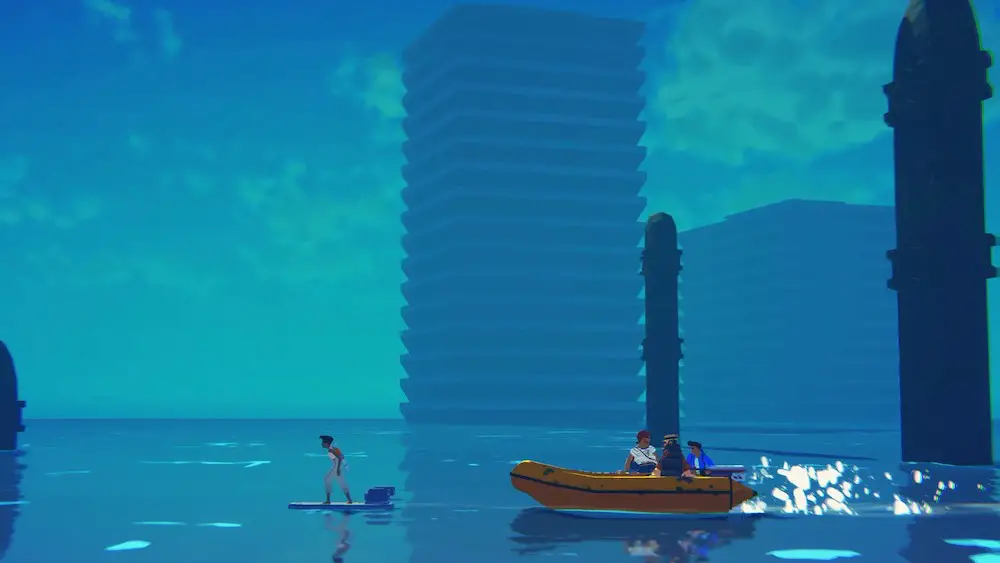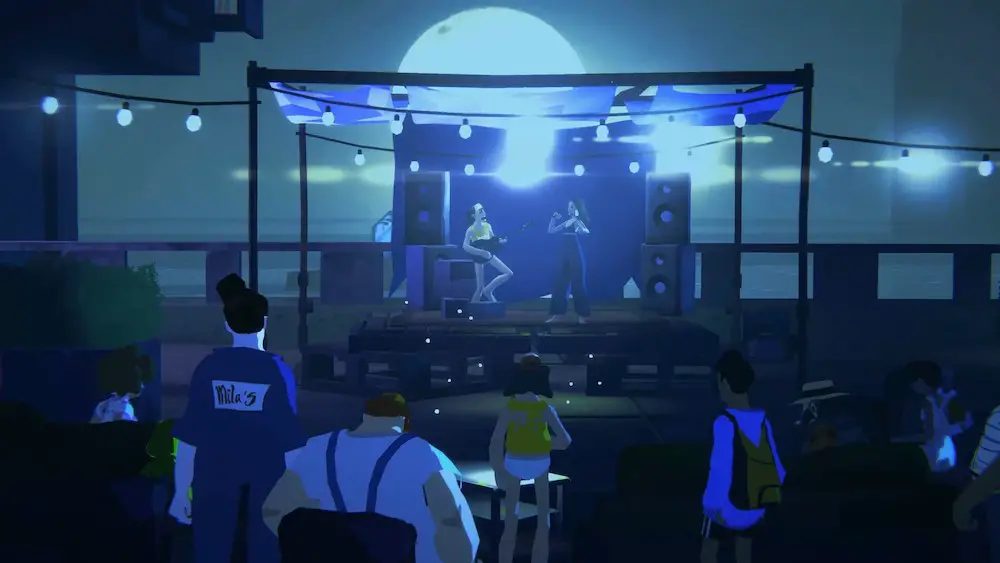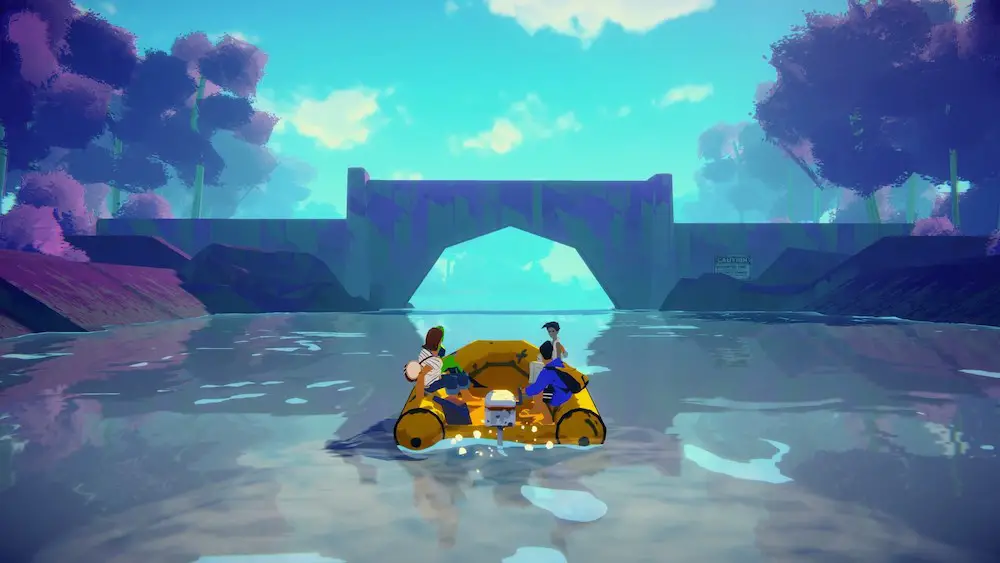
There’s something intriguing about Highwater. The low-poly art style, diverse soundtrack, stable performance – it’s a very well-presented game. But there’s also something bland about it – the one-note characters and the stagnant story are just two parts of the experience that left me wanting. Highwater is a pleasure to look at and listen to, but sadly, I just didn’t find it very interesting.
Highwater was first released in December of 2022 on mobile platforms. The game was first available to play through a Netflix subscription as part of Netflix’s ongoing mobile gaming salvo. As of March 2024, Highwater has been released on PlayStation 4 and 5, Xbox One, Xbox Series S and X, Nintendo Switch, and Windows. Developed by Demagog Studio, it is fairly obvious that this game was developed for mobile devices. Extremely simple controls, turn-based combat, and a relaxed tone make for a pretty low-stakes experience suited for the small screen. Don’t get me wrong, this is not a bad thing; just don’t go into this expecting deep game systems and high resolution visuals. The console and PC releases do not differ too much from the mobile version besides some UI changes, visual upscaling, and performance updates.
In Highwater, Earth’s environment finally gave in, leading to a global rise in sea-levels. With oceans now replacing continents, the remnants of humanity are relegated to small islands and boats in order to survive, scavenging for the scarce remaining resources and fighting to exist. The game’s narrative focuses on the journey of Nikos, a young man trapped in the flooded wastes of Highwater. Nikos dreams of infiltrating the totalitarian society of Alphaville, a high-caste city made up of technologically advanced elites. Rumors of an Alphavillain rocket escaping to Mars have burrowed deep into Nikos’ ears, leading him to set his sights on the stars and begin hatching a plan to make it to the rocket before it takes off.
Highwater is not a very long game, clocking in at around three to four hours depending on how long the average battle takes you. I thought this would be plenty of time to meet some interesting characters, flesh them out a little, give them arcs, and finish their stories in a satisfying way. I was mistaken.
All of the conversations are text-based, with the exception of a radio broadcast heard during boating sections. Nevertheless, after a full playthrough, I could only tell you a few character’s names and a handful of things about Nikos. No one ever has anything meaningful to say; they’re all way more concerned with one-liners and drawn out jokes than fostering any relationships. A few dialogue options are present in an attempt to establish some kind of agency. They are all meaningless, having no impact on any characters or encounters as far as I could tell, besides changing one or two lines of dialogue. I had so many questions about motivations, relationships, aspirations – I was given no answers. Niko’s main group of friends plan to leave the planet, but you genuinely never understand why, being left to infer that “flooded Earth = bad”. I just didn’t care about any of the characters, and when you don’t care about any characters, you certainly don’t care about the story.
My main complaint with the story of Highwater, and the game as a whole, is that it never goes anywhere. There are no interesting relationships, heart-pounding moments, or twists to speak of. It is a no frills ride from beginning to end. What you see is what you get. Nikos exclaims in the opening scene of the game that he wants to board the rocket and leave the planet… based on my complaints, you can probably guess what happens. This is a pretty major issue for a turn-based, linear game. I play games to feel something, and in terms of story, Highwater made me feel nothing at all.
Highwater may falter in the story department, but it certainly excels in its presentation. To start, the low-res art style makes for some real eye candy. The serene blue seas, lush green islands, and flooded city streets and highways that cover Highwater are a sight to behold. Many of the spaces look like they could be desktop backgrounds. At one point, the gang is taken through a chemically-created pink forest with dangerous fauna. This was undoubtedly my favorite location, as it allowed the art design to lean into itself and utilize vibrant colors and patterns. Next has to be Alphaville, the pristine cityscape setting towards the end of the game. Though only a short period of the experience takes place here, it was nice to marvel at such a grand metropolitan backdrop.
Nikos is able to take a few pictures of certain landmarks at specific locations, but I do wish there was a proper photo mode. I easily could have found a new phone background within one of the environments. Highwater also features a diverse, fitting soundtrack full of lo-fi beats and minimalist vocal tracks. I was impressed with how much the setting and art of Highwater clicked with me, and I applaud Demagog for realizing such a weird, unique setting. The setting also matched the light-hearted tone; though as previously mentioned, I wish there was more for me to latch on to in such a pretty world.
The main gameplay loop of Highwater consists of some boat piloting, incredibly light exploration, and turn-based combat scenarios. Boat piloting and island exploration go hand-in-hand, as the game shuttles Nikos and his crew from island to island in a straightforward, point A to point B corridor crawl. The game is essentially a walking (boating) sim during these sections. These boating sections would have been pretty mind-numbing if it weren’t for a somewhat entertaining radio station that periodically offers exposition and a bit of worldbuilding as well as chilled-out music. Island exploration is very simple – pull up to an island, instantly hop out of the boat, grab one or two items and read some collectable magazines or newspapers, sometimes get into a combat situation, and leave. It is about as deep as a mobile title can get in terms of exploration, and while I do understand the technical limitations, I wasn’t motivated to explore every little island after the first few.
Combat is novel at first, but overstays its welcome as the game goes on. Each turn-based scenario is more of an isometric puzzle than a true turn-based experience. The battlefield is a grid, with different characters in your party and the enemy party in basically every scenario. Think of it like a chess match: each character, good or bad, has different abilities and ways they can move around the battlefield and attack. Combat is about finding the right combination of moves, attacks, positioning, and debuffs to whittle the health of the enemy forces down to zero.
Similar to other games in its genre, Highwater’s characters all feature unique abilities. One of the characters functions as a heavy that is able to execute a spin move affecting multiple enemies at once, or jump high into the air and crash down for massive damage and debuffs. Another character plays like a rogue, darting around the battlefield with blades inflicting bleed damage. A third character acts as a healer, possessing no actual attacks and instead focusing their kit on buffs and debuffs. Though you can’t choose your party, the game is designed in a way that usually allows for a diverse party dynamic in each encounter.
Stronger more versatile options become available as the game progresses, and a few have abilities so strong they trivialize the game. The aforementioned rogue character is able to continue their turn if they end the move with a kill. I found myself abusing this ability in multiple situations with no repercussions, and felt disappointed by the game’s lack of resistance. I don’t believe that a game being easy is inherently bad, but I cannot think of a single scenario in this one where I was even remotely challenged.
Performance on PlayStation 5 was good. Highwater is undoubtedly an easy game for the console to run, so I did not experience any technical problems whatsoever. Visuals, audio, and controller inputs all function flawlessly, which was much appreciated.
Highwater is a visually distinct game with an interesting premise, arresting art style, and intuitive puzzle-style combat. Unfortunately, it never broadens the appeal past the initial impression; the story doesn’t go anywhere, the combat is too easy, and the ending is downright boring. Its brevity might be its saving grace, as this is an experience best finished quickly.
Highwater
All Right
Highwater is certainly a looker (and a sounder(?)), but its predictable combat and uninteresting story make it difficult to drudge all the way through.
Pros
- Great visuals
- Interesting first impression
Cons
- Inconsequential story
- Trivial combat



